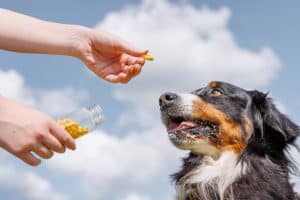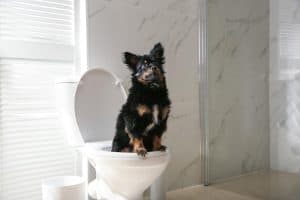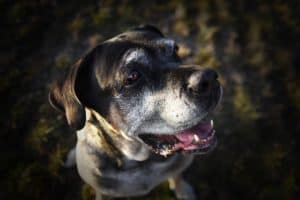The anal glands are a collection of small sebaceous glands located on both sides of the animal’s anus. These glands produce a special-smelling secretion that plays an important role in territorial marking and social communication. The anal glands are particularly important for wild animals, but domestic dogs have also retained this communication tool, although its significance has slightly decreased.
Function of the anal glands
The secretion produced by the anal glands helps dogs leave a unique scent on their territory, which informs other dogs about the presence, gender, health status, and reproductive condition of the specific animal. This form of communication is extremely important in the social life of dogs, acting as a unique “fingerprint” for them.
Characteristics of the anal glands secretion
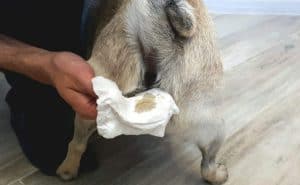
source: caninejournal.com
In a healthy state, the anal glands secretion is thick, oily, and light brown in color. Although the smell of the secretion is unpleasant to humans, it carries important information for dogs. If the glands do not function properly, the texture of the secretion can change, becoming thicker or thinner, and its color can differ from the healthy state.
Common problems
The most common problems related to the anal glands include blockage, inflammation, or infection of the glands. These issues can cause irritation, pain, and may manifest as the dog wagging its tail, “scooting” while sitting, or licking its anal area.
Symptoms
- Scooting on the floor, rubbing the anus while “sitting” on the front legs
- Swelling or redness under the tail
- Unpleasant odor
- The dog’s restlessness or frequent licking/biting of the anal area
- Visible discomfort while sitting or walking
When a dog’s anal glands are inflamed, it can lead to various health problems that may worsen without treatment. The most common consequence of inflammation is abscess formation, which can be painful for the dog and cause further complications.
Diseases arising from anal glands inflammation
- Abscess: Inflammation of the anal glands can cause an abscess, which is a pus-filled, painful swelling around the dog’s anus. The abscess can often break through the skin surface, resulting in an open wound.
- Infection: Inflamed glands can easily become infected, which can exacerbate the situation and require antibiotic treatment.
- Fistula: In cases of prolonged or recurring inflammation, fistulas, or small passages, can form, leading from the infected area under the skin to the skin surface.
Symptoms of abscess formation
- Swelling and redness at the base of the tail, around the anus
- Pain, the dog does not allow touching the sore area
- Fever and lethargy if the infection becomes more generalized
- Pus leakage when the abscess ruptures
- Foul-smelling discharge
Solutions
Diet
A proper diet containing sufficient fiber can help with the regular emptying of the anal glands. In some cases, dietary supplements, such as omega-3 fatty acids, can be beneficial for improving the health of the skin and glands.
Veterinary visit
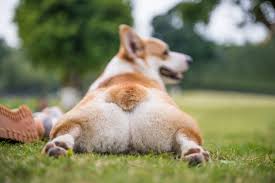
source: akc.org
If the above problems occur, it is important to consult a veterinarian. The vet will be able to manually empty the anal glands and treat inflammation or infection with appropriate medications, as the treatment of inflamed anal glands and abscesses is a veterinary task. This may include opening and draining the abscess, antibiotic and anti-inflammatory treatment, and regular emptying of the anal glands.
Dangers of home expressing
Many owners have heard that anal glands can be expressed at home, but this procedure carries serious risks. Incorrect technique can cause injury, severe pain, or infection, and it can also be very stressful for the dog. For this reason, anal gland expression should always be left to a veterinarian or a groomer trained by a professional to perform the procedure safely.
Natural solutions
Some natural remedies, such as chamomile or calendula tea compresses, can help reduce inflammation, but these should always be used under veterinary supervision.
Medication
The veterinarian may prescribe antibiotics or anti-inflammatory drugs to treat the infection or inflammation.
Surgery
In severe cases, when the anal glands consistently cause problems and other treatments are ineffective, the veterinarian may recommend surgical removal. Surgery is relatively rare and, like any operation, comes with risks, but it can provide a solution for glands that are chronically prone to inflammation.
Necessity for surgical intervention
Veterinarians usually recommend surgery only when the anal glands cause ongoing problems, such as frequent inflammation or infections, and other treatments like regular expression or medication fail to provide lasting relief. The surgery removes the glands completely, eliminating the risk of further inflammation and infection.
Which dog breeds are prone to anal glands problems?
These problems can occur in any dog, regardless of breed. However, certain small breeds, such as Beagles, Cocker Spaniels, or Chihuahuas, may experience these types of problems more frequently. This can be partly due to genetic predisposition, but diet, lifestyle, and the quality of health care also play a role.
Genetic or environmental causes?
The development of anal glands problems is a complex process influenced by multiple factors. Genetic predisposition may exist in certain breeds, but lack of exercise, constipation or soft stools, chronic stress, or inadequate hygienic conditions can also contribute to the problem. Therefore, a balanced diet, regular exercise, and routine veterinary checks are important to identify and manage these issues in time.
Related health issues
Recurring anal gland problems are often linked to other health conditions. These may include food allergies, imbalanced gut flora, chronic diarrhea, or obesity. If anal gland problems keep returning, it is advisable to consult a veterinarian for further tests, such as allergy testing, stool analysis, or even ultrasound. These can help identify underlying causes and provide a more lasting solution.
Prevention and care
Preventing anal glands problems requires maintaining proper nutrition and healthy digestion. Probiotics and digestive enzymes as dietary supplements, a fiber-rich diet including sweet potato, flaxseed, and psyllium husk, regular exercise, and keeping the dog at a healthy weight all contribute to good anal gland function. In addition, monitoring the dog’s bowel habits is crucial, and if any changes or symptoms appear, veterinary advice should be sought promptly.
Summary
Anal gland problems in dogs are quite common, but with proper care and treatment they can be effectively managed. Early detection and timely veterinary treatment are crucial to prevent more serious complications. Always keep your pet’s health and well-being in mind, and never hesitate to seek professional help when needed. You can also read about anal glands in Hungarian, if you prefer.
For more everyday tips on living with your dog, check out our page on dog sports, learn what tail wagging really means, discover how to make homemade probiotics, or explore why joint support matters.
Source: Dr. Patricia McConnell, Stanley Coren
